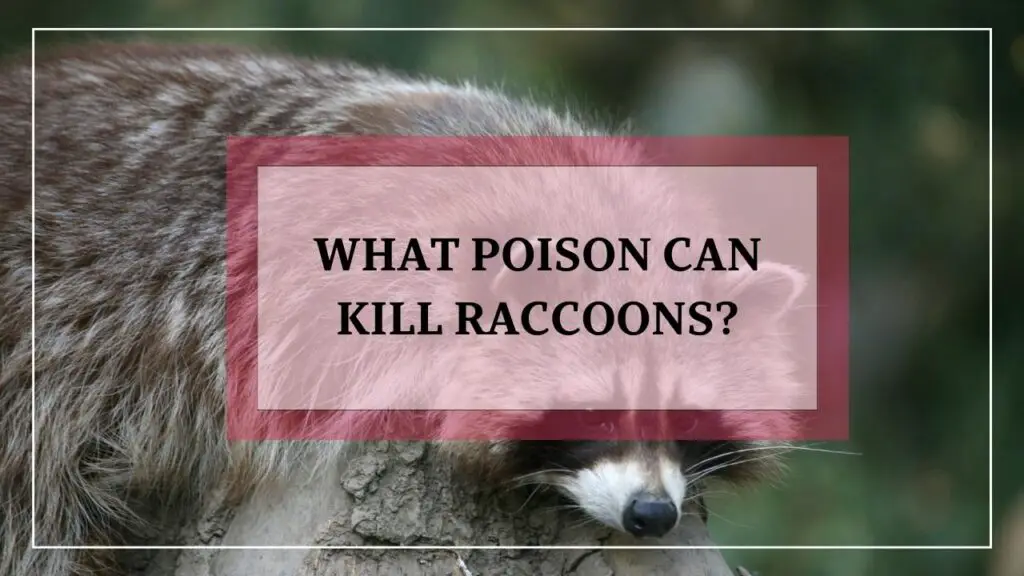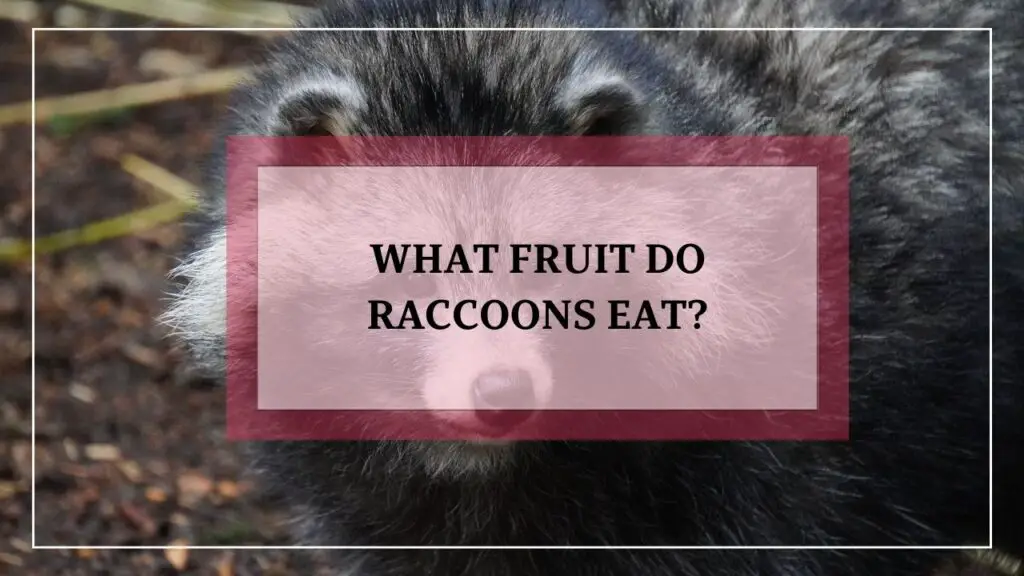Have you ever wondered what poison can kill raccoons? Well, you’ve come to the right place! Raccoons are clever creatures that can sometimes cause mischief in our neighborhoods. While it’s important to find ways to keep them away from our homes and gardens, we must also think about their safety and well-being.
Using poison to kill raccoons is not a good idea because it can harm other animals and even pets. Plus, it’s not very nice to hurt these furry animals. Instead, there are other methods we can use to keep raccoons away, such as securing our trash cans and removing any food sources they might find appealing. Remember, it’s always best to treat animals with kindness and find peaceful ways to coexist with them.
Understanding the Risks: Poisonous Substances that Can Harm Raccoons
Common Misconceptions and Important Considerations When Dealing with Raccoon Control
Hey there, friend! Today, we’re going to dive into the world of raccoon control and the potential risks that come with it. But before we get started, it’s important to approach this topic with a humane and ethical mindset. After all, these adorable masked bandits are just trying to survive in their own way.
Now, let’s debunk some common misconceptions about raccoon control. First off, using poison may seem like a quick and easy solution, but it can have serious consequences. Not only is it inhumane, but it can also harm other wildlife and even pose risks to pets and humans. So, let’s explore some safer alternatives, shall we?
The dangers of using poison to control raccoons
Legal considerations and regulations
When it comes to dealing with raccoons, it’s essential to understand the legal implications of using poison. Many jurisdictions have strict regulations in place regarding the use of toxic substances for wildlife control. It’s important to familiarize yourself with local laws and guidelines to ensure you’re acting within the legal boundaries. Remember, we want to find a humane and ethical solution to the problem.
Environmental impacts of using poison
Using poison to control raccoons can have severe consequences for the environment. The effects of secondary poisoning are a significant concern. When a raccoon consumes poison, it can pass it on to other animals that prey on it, creating a chain of contamination. This can harm not only wildlife but also pets, such as dogs and cats, who may inadvertently ingest or come into contact with the poisoned raccoon.
Furthermore, the toxins from the poison can seep into the soil, water sources, and food chains, posing a threat to the entire ecosystem. We must consider the long-term environmental impacts before resorting to such methods.
Potential risks to pets and humans
Using poison also poses risks to our furry friends and ourselves. Accidental ingestion or exposure to the poison can have serious consequences for pets, leading to illness or even death. Children and adults can also be at risk if they come into contact with the toxic substances.
It’s crucial to be aware of the symptoms of poisoning, such as nausea, vomiting, difficulty breathing, and disorientation. If you suspect someone, whether it be a pet or a person, has been exposed to poison, seek immediate medical attention.
Remember, our goal is to find safe and humane alternatives to control raccoons. Using poison should always be a last resort and only under the guidance of professionals who are trained in wildlife removal.
Now that we’ve covered the potential dangers of using poison, let’s explore non-lethal methods for raccoon control in the next section.
Non-lethal methods for raccoon control
Prevention and exclusion techniques
Okay, so you’ve realized that using poison to control raccoons is a big no-no. Good on you! Now let’s talk about some non-lethal methods that can help keep those pesky raccoons away from your property.
Securing trash cans and food sources
Raccoons are notorious for scavenging through our trash cans like they’re on a mission to find the next big feast. To prevent them from turning your trash into a buffet, make sure your trash cans have tight-fitting lids or consider investing in raccoon-proof containers. Trust me, raccoons are masters of opening lids, so don’t underestimate their determination!
Sealing potential entry points
Raccoons are sneaky little creatures and can find their way into your home through even the tiniest openings. Take a walk around your property and look for any gaps or holes that could serve as an entry point. Seal them up with steel mesh or caulk to make sure raccoons can’t wiggle their way in.
Natural deterrents and repellents
If you want to keep raccoons away without causing them any harm, there are some natural deterrents you can try. Think of it as giving them a polite “no thanks” rather than resorting to drastic measures.
Motion-activated sprinklers and lights
Raccoons are creatures of the night, so they’re not big fans of bright lights or unexpected sprays of water. Setting up motion-activated sprinklers or lights in areas where raccoons frequent can startle them and make them think twice about hanging around. Plus, it adds a little entertainment value for you as you watch them scamper away!
Natural scents and deterrent plants
Raccoons have sensitive noses, so using scents they find unpleasant can help keep them away. Try sprinkling some cayenne pepper or ammonia-soaked rags around your property. You can also plant certain flowers and herbs like marigolds, mint, or garlic, as raccoons tend to find their strong smells offensive.
Seeking professional assistance
If all else fails and those raccoons just won’t take the hint, it may be time to call in the experts. Licensed wildlife removal experts have the knowledge and experience to safely and humanely handle raccoon control. They can set up live traps and safely relocate the raccoons to a more suitable habitat. Leave it to the professionals, they’ve got your back!
Safe alternatives to poison for raccoon control
Frightening devices and noise deterrents
When it comes to keeping raccoons away, sometimes a little scare is all it takes. There are a few nifty gadgets you can use that will make those raccoons think twice about coming near your property.
1. Ultrasonic devices
These clever contraptions emit high-frequency sounds that are undetectable to humans but irritating to raccoons. It’s like having a raccoon repellent symphony playing in your backyard! Just make sure to adjust the frequency to match the raccoon’s sensitive hearing range for maximum effect.
2. Noise emitters and alarms
If you want to add a little drama to your raccoon repelling efforts, consider using noise emitters or alarms. These devices can mimic the sound of a predator or create loud, sudden noises that startle those mischievous critters. Just be sure to warn your neighbors first, unless you want them to think you’ve joined a marching band!
Physical barriers and exclusion methods
Raccoons are quite the acrobats, so it’s important to create physical barriers that will deter them from accessing your property. Here are a couple of effective methods:
1. Electric fences and wire mesh barriers
Imagine a raccoon trying to break into Fort Knox – it’s just not going to happen. Electric fences and wire mesh barriers create a formidable obstacle for those crafty critters. Just make sure the electric fence is properly installed and doesn’t zap any unsuspecting visitors (unless they’re raccoons, of course).
2. Chimney caps and tree wraps
Raccoons are notorious for sneaking into chimneys and wreaking havoc. Installing a sturdy chimney cap will keep them out and save you from a chimney full of surprises. For those mischievous raccoons who think trees are their personal playground, tree wraps provide a slippery surface that discourages climbing. It’s like giving them a fancy raccoon-sized slip ‘n slide!
Repellents and taste aversion techniques
When all else fails, it’s time to bring out the big guns – repellents and taste aversion techniques.
1. Capsaicin-based sprays
Remember that time you accidentally rubbed your eyes after cutting up a spicy chili pepper? Yeah, raccoons won’t forget that either. Capsaicin-based sprays create a fiery experience for raccoons, making your property less appealing than a bowl of bland oatmeal. Just be careful not to accidentally spray yourself – you don’t want to be the one running around with watery eyes!
2. Ammonia-soaked rags or cotton balls
Raccoons have a sensitive sense of smell, so why not use it against them? Soak some rags or cotton balls in ammonia and strategically place them around your property. The strong smell will make raccoons think twice about getting too close. It’s like having your own personal raccoon repelling perfume – eau de ammonia!
FAQs
1. What poison can kill raccoons?
Using poison to kill raccoons is not recommended as it can be inhumane and cause unnecessary suffering for the animal. Additionally, the use of poison may be illegal in many jurisdictions. It is advised to explore alternative methods such as trapping and relocation, or seeking assistance from professional wildlife control services.
2. Are there any natural remedies to deter raccoons without using poison?
Yes, there are several natural remedies that can help deter raccoons. These include using strong odors such as ammonia or vinegar near their entry points, securing garbage cans with tight-fitting lids, removing potential food sources like fallen fruits or pet food, and installing motion-activated sprinklers or lights to scare them away.
3. Is it legal to use poison to kill raccoons?
The legality of using poison to kill raccoons varies depending on the jurisdiction. In many places, it is illegal to use poison to kill raccoons or any other wildlife, as it can pose risks to other animals and the environment. It is important to check with local wildlife agencies or authorities to understand the specific regulations in your area before considering any lethal methods.
Conclusion
In conclusion, it is crucial to approach raccoon control with an understanding of the potential risks involved and the importance of humane and ethical methods. Using poison to control raccoons poses numerous dangers, both to the environment and to other wildlife, as well as to pets and humans. The legal considerations and regulations surrounding the use of poison further highlight the need for safer alternatives.
Non-lethal methods for raccoon control, such as prevention and exclusion techniques, natural deterrents, and seeking professional assistance, offer effective and environmentally friendly solutions. These methods not only prevent conflicts with raccoons but also promote coexistence and conservation efforts.
Safe alternatives to poison include frightening devices and noise deterrents, physical barriers and exclusion methods, and repellents and taste aversion techniques. These options can help deter raccoons without causing harm to them or the surrounding ecosystem.
Educating others about raccoon conservation and coexistence is also essential. By promoting understanding and appreciation for raccoons, busting common myths and misconceptions, and encouraging responsible pet ownership and waste management, we can contribute to a more harmonious relationship with these fascinating creatures.
In conclusion, it is crucial to prioritize the use of humane and environmentally friendly methods when dealing with raccoon control. By doing so, we can protect both raccoons and the delicate balance of our ecosystems, ensuring a safer and more sustainable future for all.



